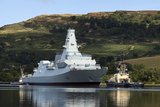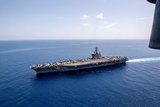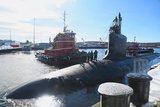First frigate delivered to Indonesian Navy
The first of two frigates being built by Damen Schelde Naval Shipbuilding for the Indonesian Navy has been handed over to the Indonesian Ministry of Defence, Damen announced on 2 February.
Damen is building the two SIGMA 10514 PKR frigates for the navy under a contract signed in December 2012. The first vessel has been named Raden Eddy Martadinata.
The 105-metre, 2365t PKR frigates are designed for a range of missions including anti-air, anti-surface and anti-submarine warfare. They are also equipped for maritime security, search and rescue, and humanitarian support tasks.
The Raden Eddy Martadinata was built using a collaborative modular process operating simultaneously at Damen Schelde Naval Shipyard in the Netherlands and PT PAL shipyard. The vessel is made up of six modules, and for the Raden Eddy Martadinata four of these were built at PT PAL while the other two modules – the power plant and the bridge and command centre - were built and fully tested at Damen Schelde Naval Shipbuilding before being shipped for final assembly at PT PAL.
Construction of the second frigate using the same procedure is now well advanced with sea trials due May 2017, and delivery October 2017.
More from Naval Warfare
-
![US Navy to develop an undersea networking capability to support UUV operations]()
US Navy to develop an undersea networking capability to support UUV operations
The NEREUS project aims to enhance and expand the US Navy’s existing communications systems, enabling crewed/uncrewed seabed and subsurface missions.
-
![How the Hedge Strategy will impact the US Navy’s future capabilities]()
How the Hedge Strategy will impact the US Navy’s future capabilities
The US Navy Hedge Strategy is intended to provide a lethal, modular and cost-effective fleet while accepting Washington’s fiscal and industrial constraints.
-
![US Navy and Raytheon explore additional applications for Mk 58 CRAW torpedo]()
US Navy and Raytheon explore additional applications for Mk 58 CRAW torpedo
Designed as an anti-torpedo and anti-submarine capability, the USN and RTX foresee the Compact Rapid Attack Weapon’s potential for deployment from surface ships and aerial and uncrewed platforms.





















